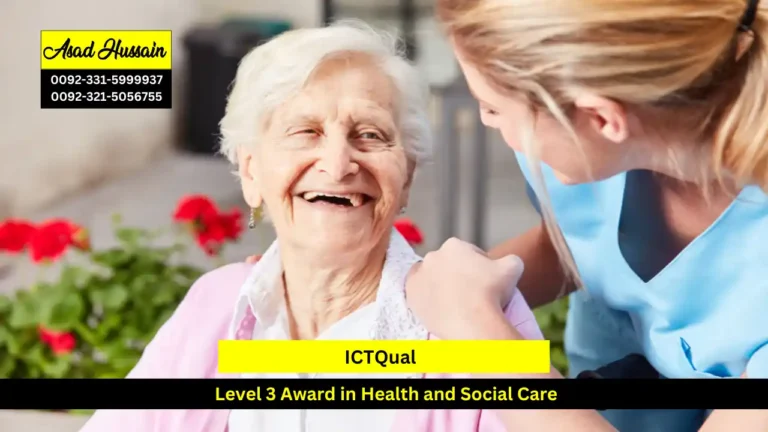The ProQual Level 2 Award in Healthcare and Social Care Support Skills provides a concise and focused introduction to the fundamental principles of care delivery. This entry-level qualification is designed for individuals who wish to gain a foundational understanding of health and social care without committing to a longer programme of study. Learners will explore essential topics including communication, confidentiality, safeguarding basics, and the importance of person-centred approaches. The Award is assessed through portfolio building, allowing candidates to demonstrate their knowledge through written tasks and reflective accounts that relate directly to real-world care environments and everyday support interactions.
This qualification is ideal for those seeking a manageable starting point within the care sector. The curriculum has been carefully structured to cover the most critical elements of safe and effective practice, enabling learners to quickly grasp core concepts and apply them in supervised settings. Topics such as equality and inclusion, duty of care, and understanding roles within care teams are presented in an accessible format suitable for learners with varying levels of prior knowledge. Successful completion confirms that an individual possesses awareness of key care standards and is ready to contribute positively within supportive care environments under appropriate supervision.
The ProQual Level 2 Award in Healthcare and Social Care Support Skills serves as a valuable first step for anyone exploring career opportunities within the caring professions. Upon achievement, learners may choose to pursue further certifications in specialised areas such as moving and handling, medication awareness, or infection prevention and control. More advanced diplomas in health and social care also provide natural progression routes for those wishing to expand their knowledge further. This Award stands alone as a meaningful introduction to care, validating both commitment and capability while opening initial doors to employment and voluntary opportunities across a range of service settings.
Program Highlights
Study Units
To achieve the ProQual Level 2 Award in Healthcare and Social Care Support Skills qualification candidates must achieve 6 credits from any combination of units.
| Sr# | Unit Title | Credit Value | GLH |
|---|---|---|---|
| 1 | Implement person centred approaches in health and social care | 5 | 33 |
| 2 | Principles of safeguarding and protection in health and social care | 3 | 26 |
| 3 | Assist in the administration of medication | 4 | 25 |
| 4 | Carry out personal hygiene for individuals unable to care for themselves | 3 | 23 |
| 5 | Support individuals with speech and language disorders to develop their communication skills | 4 | 28 |
| 6 | Perform the non-scrubbed circulating role for perioperative procedures | 3 | 23 |
| 7 | Minimise the risk of infection when transporting and storing healthcare waste | 3 | 20 |
| 8 | Assist in the issuing of prescribed items | 3 | 15 |
| 9 | Assist in the manufacture and assembly of medicinal products | 7 | 20 |
| 10 | Assist in the preparation of documentation, materials and other items for manufacture and assembly of medicinal products | 10 | 40 |
| 11 | Support individuals to carry out their own health care procedures | 2 | 15 |
| 12 | Provide support for therapy sessions | 2 | 14 |
| 13 | Contribute to the discharge of individuals to carers | 2 | 14 |
| 14 | Paediatric Emergency First Aid | 1 | 10 |
| 15 | Introduction to communication in health, social care or children’s and young people’s settings | 3 | 23 |
| 16 | Support individuals to meet personal care needs | 2 | 16 |
| 17 | Contribute to the safe use of medical devices in the perioperative environment | 4 | 29 |
| 18 | Causes and Spread of Infection | 2 | 20 |
| 19 | Prepare documentation, materials, components and other items for the preparation of aseptic products | 6 | 10 |
| 20 | Introduction to duty of care in health, social care or children’s and young people’s settings | 1 | 9 |
| 21 | Provide support for mobility | 2 | 14 |
| 22 | Assist others to plan presentations | 2 | 16 |
| 23 | Order Routine Pharmaceutical Stock | 3 | 11 |
| 24 | Dementia Awareness | 2 | 17 |
| 25 | Move and position individuals in accordance with their plan of care | 4 | 26 |
| 26 | Support individuals to manage continence | 3 | 19 |
| 27 | Handle information in health and social care settings | 1 | 10 |
| 28 | The role of the health and social care worker | 2 | 14 |
| 29 | Obtain and test specimens from individuals | 2 | 12 |
| 30 | Prepare individuals for healthcare activities | 3 | 17 |
| 31 | Assist in planning and evaluating learning activities | 3 | 22 |
| 32 | Assist the practitioner to carry out health care activities | 2 | 13 |
| 33 | Minimise the risk of infection during the removal of used linen | 2 | 15 |
| 34 | Inform an individual of discharge arrangements | 2 | 13 |
| 35 | Understand the context of supporting individuals with learning disabilities | 4 | 35 |
| 36 | Select and wear appropriate personal protective equipment for work in health care settings | 2 | 15 |
| 37 | Monitor and maintain the environment and resources during and after clinical / therapeutic activities | 3 | 20 |
| 38 | Prepare and dress for scrubbed clinical roles | 4 | 28 |
| 39 | Care for individuals with naso-gastric tubes | 3 | 20 |
| 40 | The principles of Infection Prevention and Contro | 3 | 30 |
| 41 | Assist with the provision of a pharmacy service to meet individuals’ needs | 3 | 10 |
| 42 | Contribute to the effectiveness of teams | 3 | 5 |
| 43 | Introduction to personal development in health, social care or children’s and young people’s settings | 3 | 23 |
| 44 | Support individuals who are distressed | 3 | 21 |
| 45 | Support individuals undergoing healthcare activities | 3 | 22 |
| 46 | Prepare equipment for intraoperative cell salvage blood processing | 4 | 26 |
| 47 | Assist in receiving, handling and dispatching clinical specimens | 2 | 17 |
| 48 | Assist in the sale of medicines and products | 8 | 50 |
| 49 | Receive Pharmaceutical Stock | 3 | 9 |
| 50 | Prepare aseptic products | 10 | 40 |
| 51 | Prepare and apply dressings and drains to individuals in the perioperative environment | 2 | 18 |
| 52 | Planning and Monitoring Work | 2 | 8 |
| 53 | Cleaning, Decontamination and Waste Management | 2 | 20 |
| 54 | Ensure your own Actions Reduce risks to Health and Safety | 2 | 8 |
| 55 | Introduction to equality and inclusion in health, social care or children’s and young people’s settings | 2 | 20 |
| 56 | Provide agreed support for foot care | 3 | 23 |
| 57 | Contribute to health and safety in health and social care | 4 | 33 |
| 58 | Support independence in the tasks of daily living | 5 | 33 |
| 59 | Prepare equipment for intraoperative cell salvage blood collection | 2 | 17 |
| 60 | Maintaining quality standards in the health sector | 1 | 8 |
| 61 | Emergency First Aid Skills | 1 | 10 |
| 62 | Assemble prescribed items | 3 | 15 |
| 63 | Support participation in learning and development activities | 3 | 23 |
| 64 | Provide support for sleep | 2 | 13 |
| 65 | Remove wound closure materials | 3 | 24 |
| 66 | Support individuals to eat and drink | 2 | 15 |
| 67 | Undertake agreed pressure area care | 4 | 30 |
| 68 | Meet food safety requirements when providing food and drink for individuals | 2 | 15 |
| 69 | Understand loss and grief in end of life care | 3 | 22 |
| 70 | Understand how to work in end of life care | 3 | 28 |
Entry Requirements
The entry requirements for this qualification have been designed to be as accessible as possible, ensuring that individuals from diverse backgrounds and with varying levels of experience can begin their journey into health and social care without unnecessary barriers.
- Age Requirements: Learners must be at least 14 years of age. This lower age threshold makes the Award particularly suitable for school students, college learners, and young people exploring career options within the care sector through work experience programmes or vocational taster courses.
- Educational Background: No formal academic qualifications are required for entry onto this programme. However, learners may find it helpful to have completed basic introductory certifications such as the Level 1 Award in Preparing to Work in Adult Social Care, Entry Level Essential Skills qualifications, or short courses in subjects like first aid or customer service. Related diplomas in areas such as childcare, volunteering, or personal development also provide a useful foundation.
- Language Proficiency: Learners should possess a basic level of literacy in English sufficient to understand core care terminology and complete short written tasks for their portfolio. A minimum equivalent to Entry Level 2 or GCSE grade E/2 in English is recommended, though centres are encouraged to provide additional learning support where required.
- Work experience: This is not a requirement for entry onto this Award programme. The qualification is specifically designed to accommodate complete beginners, including those who have never worked or volunteered in a care setting before. All necessary knowledge is taught within the course, making it an ideal starting point for individuals with no prior exposure to the sector.
These entry criteria reflect the inclusive and welcoming nature of this qualification. Whether you are still at school, returning to education after a break, or simply curious about whether a care career might suit you, this Award offers a supportive and low-pressure environment in which to learn, grow, and discover your potential. No previous certificates or diplomas are required, only a genuine interest in the wellbeing of others and a willingness to learn.
Learning Outcomes
Upon completion of the ProQual Level 2 Award in Healthcare and Social Care Support Skills, learners will achieve the following learning outcomes:
- Knowledge of Healthcare and Social Care Environment: Gain a comprehensive understanding of the healthcare and social care sector, including its key principles, values, policies, and regulations. Develop insights into the roles and responsibilities of healthcare and social care professionals.
- Effective Communication: Enhance communication skills to establish positive and meaningful interactions with individuals receiving care, their families, and other healthcare professionals. Learn techniques to listen actively, convey information clearly, and adapt communication to different needs and preferences.
- Health and Safety Procedures: Acquire knowledge of health and safety protocols and practices in healthcare and social care settings. Understand the importance of maintaining a safe and secure environment for individuals and staff. Learn how to identify and respond to potential hazards and emergency situations effectively.
- Safeguarding Individuals: Gain an understanding of safeguarding principles and procedures to ensure the well-being and protection of vulnerable individuals. Learn how to recognize signs of abuse or neglect and take appropriate action, including reporting concerns and supporting individuals in crisis.
- Person-Centered Care: Develop skills in providing person-centered care, focusing on the individual’s unique needs, preferences, and aspirations. Learn how to promote dignity, respect, and independence while supporting individuals with personal care, mobility, and daily activities.
- Promoting Equality and Inclusion: Gain awareness of the importance of equality, diversity, and inclusion in healthcare and social care. Learn how to promote and uphold these principles while providing support, ensuring that individuals’ rights and choices are respected.
- Collaboration and Teamwork: Understand the significance of collaborative working within the healthcare and social care sector. Learn how to effectively communicate and work as part of a team, maintaining positive relationships with colleagues, professionals from other disciplines, and external stakeholders.
- Reflective Practice and Continuous Learning: Develop the skills of self-reflection and self-evaluation to continuously improve personal practice and enhance professional development. Learn how to seek feedback, identify areas for improvement, and engage in lifelong learning to stay updated with industry advancements.
These learning outcomes are designed to equip learners with the necessary knowledge, skills, and attitudes to provide high-quality support and care in healthcare and social care settings. Successful completion of the course will enable individuals to contribute effectively to the well-being and welfare of individuals receiving care, while adhering to industry standards and best practices.
Target Audiences
The ProQual Level 2 Award in Healthcare and Social Care Support Skills is designed for individuals who are completely new to the care sector or those seeking a short, accessible introduction to the core principles of health and social care. This qualification is ideal for learners who may feel unsure about committing to a longer programme and wish to test their interest and aptitude before progressing further. It is also well suited to young people, career explorers, and those returning to education who require a flexible and supportive starting point that builds confidence alongside knowledge.
- School Students and College Learners – Individuals aged 14 and above who are undertaking work experience, careers education, or vocational taster programmes and wish to gain a recognised qualification that introduces them to the caring professions.
- Complete Beginners with No Care Experience – Those who have never worked or volunteered in a care setting before and require a gentle, structured introduction to fundamental topics such as communication, safeguarding, and person-centred support.
- Career Explorers and Undecided Learners – Individuals who are considering a future in health and social care but wish to sample the subject area through a short, manageable qualification before committing to longer certificates or diplomas.
- Volunteers Seeking Formal Recognition – Unpaid carers, community helpers, or charity volunteers who have developed basic practical experience and now desire a formal Award that validates their foundational knowledge and commitment.
- Returners to Education – Adults who have been away from formal learning for some time and require an accessible, low-pressure qualification that rebuilds study skills while introducing an interesting and meaningful subject area.
- Holders of Introductory Certificates – Learners who have completed basic qualifications such as the Level 1 Award in Introduction to Health and Social Care, Entry Level Essential Skills, or short courses in subjects like first aid or customer service, and wish to take their first step beyond introductory level.
This qualification is for the curious, the compassionate, and those taking their very first steps. It is for the teenager exploring future careers, the adult considering a fresh start, and the volunteer seeking recognition for the kindness they already show. Whether you hold related certificates or hold nothing more than a desire to help others, this Award welcomes you warmly and provides the ideal foundation upon which to build your future in care.







